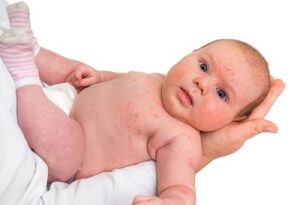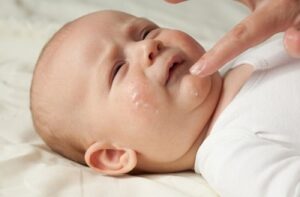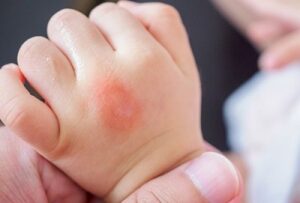 Most babies have some eczema, a skin condition that causes the skin to become dry, itchy, and inflamed. Eczema is not contagious, but it can be irritating and uncomfortable for your baby. Fortunately, many ways to treat baby eczema and help your child feel better.
Most babies have some eczema, a skin condition that causes the skin to become dry, itchy, and inflamed. Eczema is not contagious, but it can be irritating and uncomfortable for your baby. Fortunately, many ways to treat baby eczema and help your child feel better.
Table of Contents
What is Eczema
Eczema is a skin inflammation that causes irritation, dehydrated skin, rashes, flaky patches, blisters, and infections. One of the most common signs of eczema is itchy skin. Eczema can be separated into seven types: atopic dermatitis, contact dermatitis, dyshidrotic eczema, nummular eczema, seborrheic dermatitis, and tension dermatitis.
Eczema occurs in more than 31 million individuals in the United States. Eczema can appear at any age and can be mild or severe. Eczema may begin during infancy, puberty, or adulthood, ranging from minor to significant. Newborn infants can have eczema within the first weeks and months of life. Children with eczema who are younger than 18 months of age can have patches of severely dry skin and itchy skin that may result in blisters and also other infections due to roughness.
Many persons with eczema use the word “flare-up” to describe a stage of dermatitis when they are experiencing numerous strong indications and symptoms or adverse effects from prolonged itching; severe eczema can include periods of flare-ups that can last for days or even several weeks. Creams, antihistamines, topical steroid lotions, and corticosteroids are just a few of the possible eczema treatment pathways that dermatologists, skin doctors, and the American Academy of Dermatology (AAD) typically recommend.
Atopic dermatitis, the most common type of eczema (in some cases known as “atopic dermatitis”), is caused by an overactive immune system that leads to dry, scaly skin. Eczema isn’t contagious; you can’t get it from someone else by catching it. Eczema is an inflammatory skin disorder characterized by severe itching and discomfort.
While the precise cause of eczema remains unknown, researchers do know that it develops due to interactions between genetics and ecological factors. Many people with eczema suffer from additional comorbid problems such as hay fever, sensitive asthma, and food allergies. Correct, consistent skin care is required to prevent and treat eczema.
The Difference Between Eczema and Acne
Eczema and acne are two distinct skin diseases. Because their symptoms and indications may appear similar, it might be difficult to tell them apart.
Acne causes the acne to break out. Eczema can cause a red or scaly, rough breakout that resembles acne.
Eczema and acne have a variety of causes as well as treatments. It’s possible to have both simultaneously, although they’re usually focused on different parts of your face and body.
Occasionally, the rash develops larger bumps that resemble pimples.
Eczema is a catchall term for a collection of seven skin issues. Each kind is identified by:
- Rash
- Itching
- Inflammation
Irritants or toxic irritants in the environment can cause eczema flare-ups. These factors stimulate your immune system, resulting in inflammation and associated eczema symptoms.
Meanwhile, acne is not due to an immunological response of the body. Hormone changes such as those associated with puberty age might be responsible for your acne if you have it.
Individuals with acne frequently have greasy skin due to sweat glands’ overproduction of sebum (oil). This causes the pores to become blocked with:
- Bacteria
- Dead skin cells
- Excess oil
Acne breakouts can cause the following symptoms:
- Blackheads
- Pimples
- Cysts
- Nodules
- Whiteheads
Eczema, unlike acne, causes your skin to produce less oil than it should and does not retain water. Dehydrated skin can be the result of these factors.
The most notable distinction between eczema and acne is itching. Dermatitis can give rise to uncontrollable irritation, while pimples do not.
Baby Eczema and Other Skin Conditions
Atopic dermatitis has completely dry, scaly breakouts that are scratchy and ooze fluid. Several other skin diseases may be mistaken for or resemble atopic dermatitis. These consist of:
Tinea
Tinea is a fungal infection that affects the skin, most often on the scalp. It resembles a red, flaky patch with defined edges that is extremely itchy, and the surface may also be raised or scaly. On lighter skin, tinea appears as red or pink patches, while brown or gray spots appear on darker skin.
Seborrheic Dermatitis
Seborrheic dermatitis affects the scalp and face, but it can also affect the folds of the arm and abdomen. Cradle cap is a medical term for when a baby’s scalp becomes inflamed and scaly.
In contrast to atopic dermatitis, seborrheic dermatitis is characterized by the presence of:
- A lack of itching is far less bothersome than atopic dermatitis and does not interfere with a youngster’s sleep.
- Patches of flaky skin: The skin around their eyes is lighter in clients with darker skin tones.
- Thick greasy scales: The scales on the hands and arms appear more glistening than the dry scales dermatologists see in atopic dermatitis.
It’s crucial to keep in mind that an infant can have both seborrheic dermatitis and atopic dermatitis at the same time.
Ringworm
Ringworm is a fungus that infects the skin. The most typical symptom is a breakout with a red border, which can appear quickly or take several days to develop. A ringworm infection on the scalp or temple is typical in babies and small children.
It is similar to atopic dermatitis in that it has a flaky, itchy appearance and is typically uncomfortable. Babies, on the other hand, may experience tiny patches of hair loss or alopecia.
Psoriasis
In young children, psoriasis and atopic dermatitis symptoms are often very similar. Psoriasis commonly appears on the face and scalp, with arid regions. On the other hand, psoriasis is uncommon in infants, and it is more common to develop after age 5.
Unlike atopic dermatitis, the rash is generally found in the infant diaper area. Another sign of psoriasis is a nail match. Nail pits are little fears or dents in the fingernails or toenails. Infants rarely have this symptom.
Signs and symptoms of Eczema
 The signs and symptoms of eczema differ widely from person to person and typically include the following:
The signs and symptoms of eczema differ widely from person to person and typically include the following:
- Brownish-gray marks, in particular, are seen on the hands, feet, ankle joints, wrists, neck, top chest, eyelids, inside the bend of the arm joints and knees in newborns; also on baby’s faces and scalps.
- Raw, sensitive, inflamed skin from square one
- Dry skin
- Little, increased bumps, which might leak liquid and also crusted over when scratched.
- Itching, which may be extreme, especially at night
- Thickened, broken, flaky skin
While eczema can appear at any age, it generally starts before five and may continue into adulthood. It might flare up frequently and then go away for a time, even years later.
Causes of Eczema
Environmental factors, such as a reaction between your genes and your environment, might contribute to eczema. When an irritant or an irritant from the outside or inside the body activates the skin’s immune system, it produces swelling, or a flare-up, on the skin’s surface.
The skin in those regions becomes thick, inflamed, and scaly. The creases and folds of the skin, especially those near the elbows, knees, lower legs, and other places where two surfaces touch each other, might cause inflammation. There’s also a genetic component to dermatitis, which comprises a healthy protein called “filaggrin” that aids in retaining moisture in your skin; a lack of filaggrin can cause dry, itchy skin.
Many everyday family activities, as well as other factors, can also cause eczema flare-ups. The following are additional typical causes of eczema:
- Formaldehyde, which is present in several home antibacterial, some injections, glues, and adhesives
- scents in candles
- surface cleaners as well as disinfectants
- expanded direct exposure to dry air, severe heat, or cold
- some types of soap, shampoo, bubble bath, body wash, face cleansers
- laundry cleaning agents and also fabric softeners with chemical additives
- certain materials like wool or polyester in apparel as well as sheets
- all-natural fluids like the juice from fruit, veggies, and also meats.
- metals, especially nickel, in precious jewelry or utensils
- isothiazolinone, an antibacterial found in individual treatment items like infant wipes
- paraphenylenediamine, which is used in leather dyes and short-lived tattoos
Emotional stress, too, might cause an eczema outbreak. However, it’s uncertain why this is the case. When people are really anxious, their eczema symptoms and flare-ups worsen. Others may become anxious just knowing they have eczema, which can result in an outbreak of their skin.
Triggers of Eczema Flare-ups
 Triggers aren’t always the same for everyone. You could be sensitive to one thing but not another.
Triggers aren’t always the same for everyone. You could be sensitive to one thing but not another.
Eczema is a highly individual disease. Eczema has many different symptoms for each person. You could have eczema symptoms on particular days of the year or at various locations in your body.
Typical triggers are:
Dry skin
When your skin becomes too dry, it can rapidly become fragile, flaky, rough, or limited, leading to an eczema outbreak. You will have to discover more about the importance of moisturizing eczema-irritated skin and lotions and creams for severe eczema flare-ups.
Irritants
Many chemicals and natural elements can irritate, burn, and itch your skin. Food, like cosmetics or fragrances, and contaminant dust from your home or work may also cause allergies. These contaminants can come from things you use on your body or home, such as hand and meal soap, laundry detergent, shampoo, bubble baths, body wash, perfume, or other items with added scents.
Some all-natural liquids, such as fresh fruit, vegetable, or meat juice, can irritate your skin if you touch them.
Stress and Anxiety
Although the connection between eczema and psychological anxiety is speculative, it’s believed that it may be caused by psychological stress. Eczema symptoms can become more severe when people are worried or anxious. Simply knowing you have eczema might make your scratchy skin flare-up for some individuals.
Treating Baby Eczema
It may be difficult if you’re dealing with eczema due to factors you can’t manage, such as genetics. Fortunately, you have some control over your environment and stress levels. Do everything you can to find out what causes or exacerbates your baby’s eczema so that you can avoid it. The goal is to alleviate itching and discomfort and prevent infection and exacerbation.
Consider the following therapy tips:
- Assist them in avoiding rubbing or aggravating the rash.
- Apply ointments twice or three times a day. It’s essential to keep your skin hydrated during the cold, dry winter. Apply moisturizers several times each day, especially while bathing babies with eczema.
- Keep the skin area as cool as possible. The skin might dry out due to changes in room temperature and moisture.
- While the skin is still wet, apply lotion right away. This will help retain moisture in the skin.
- Washing with a mild detergent and ensuring that the clothes are completely washed is essential.
- Bathrooms that are too long, hot, or steamy can dry the skin. Instead of scalding water, use lukewarm water and provide sponge bathrooms for your kid.
- Maintain your child-worn cotton. Wool, silk, and manufactured materials such as polyester can irritate the skin.
- Keep an eye out for skin issues. If you detect an infection, see your doctor immediately.
Tips to Handle Itching
- Using skin cleansers with low pH.
- Apply a cool compress.
- Understand and avoid your itch sets off.
- Pinch and pat the scratchy skin (as opposed to damaging).
- Take an apple cider vinegar bath or weaken it and contribute to a cool compress.
- Put on soft, breathable, all-natural clothes alongside your baby’s skin.
- Avoid resting on turf, plastic chairs, or harsh carpeting and upholstery with bare legs.
- Do damp cover treatment.
- Hydrate regularly throughout the day with a lotion or lotion that contains ceramides.
Minimizing the Risk of Eczema
There are things you can do to avoid eczema flare-ups:
- Set up a skin treatment routine and adhere to your medical care expert’s recommendations for maintaining good health.
- Avoid known irritants and allergens.
- Avoid scratching or rubbing scratchy areas of skin.
- Make your own moisturizing lotion by combining liquid castile soap with a non-greasy, light oil. Instead of rubbing, use a light soap for your bath or shower and allow your skin to dry thoroughly before applying any cream. To help keep the moisture in, apply a hydrating lotion or ointment right after drying
- Bathrooms or showers should be held at a comfortable temperature of lukewarm rather than warm.
- Try your best to avoid being both hot and sweaty.
- Put on clothing made of cotton or other natural materials that are comfortable for your baby. Before wearing new clothes, wash them first. Woolen garments should be avoided at all costs.
- Wear gloves for activities that require you to put your hands in water. To take in sweat, wear cotton gloves under plastic handwear covers while working outside, and don’t forget to use handwear covers when it’s cold out.
- Maintain a consistent temperature and humidity level.
Diagnosing Eczema
Your doctor’s consultation will most certainly need to go through several details. Make sure you’re clear on your symptoms and indicators. The following are questions your doctor will likely ask:
- Where is eczema on your child’s skin?
- What have you tried to cure your eczema?
- What medical issues does your infant have? Are there any allergies or asthma problems?
- Is there a history of eczema in your family?
- How long has your baby been showing signs and symptoms of eczema?
- Do you bathe your baby in a warm bath or shower?
- Is there anything else that makes your baby’s condition worse?
- Have you ever observed anything that sets off or aggravates your baby’s eczema? Soaps, cleaning chemicals, and cigarette smoke are all possible causes.
- Is there a lot of itching on your baby’s skin? Can they sleep, perform tasks, or engage in leisure activities?
When to Get in Touch with a Doctor
Emergency Care
- Your kid looks or acts really unwell.
They’re also typically inflamed, painful, and have a lot of pus or soft exuding scabs. - High temperature in a newborn who is less than 12 weeks old. Take note that you should not give your kid any type of high fever medication until they have been seen by a doctor.
- Blisters and lumps develop all over the body.
Within 24 hour
- Eczema is highly unpleasant to the touch.
- It isn’t hot yet, but it’s clearly infected.
- Itching is severe for more than 48 hours after applying a steroid cream.
Final Thoughts Baby Eczema
Eczema is a common skin condition that can be very uncomfortable for infants and adults. Although there is no cure, there are ways to manage the symptoms and keep flare-ups under control. By following the tips above, you can help your child find relief from eczema and avoid any further discomfort.

